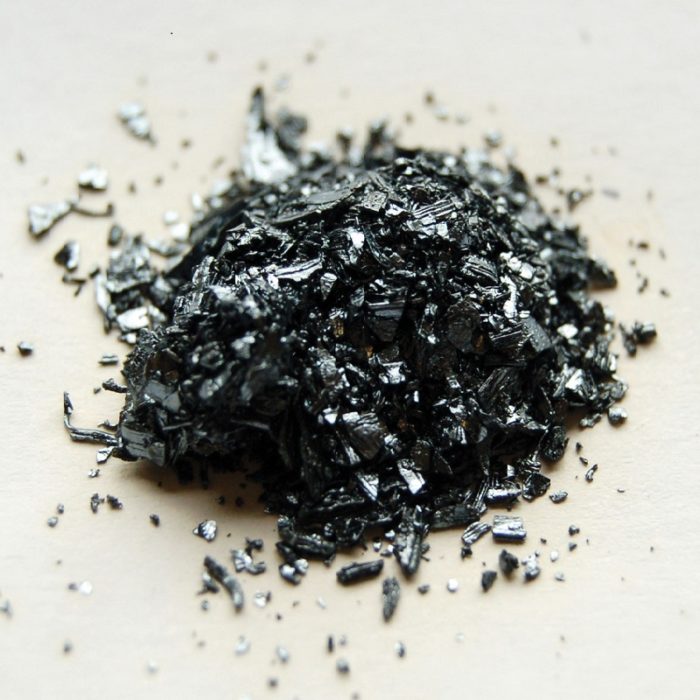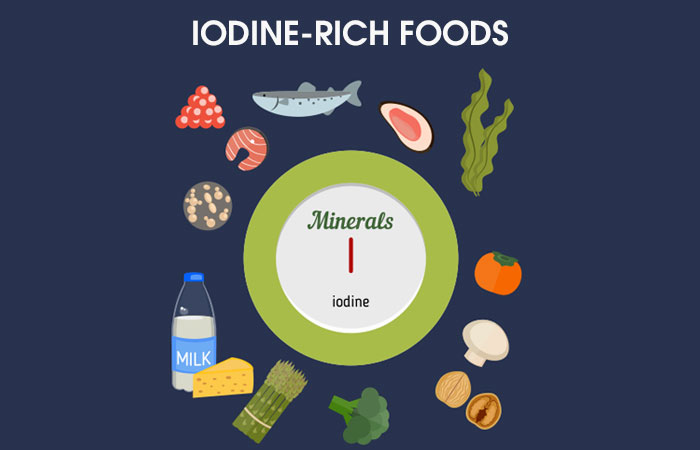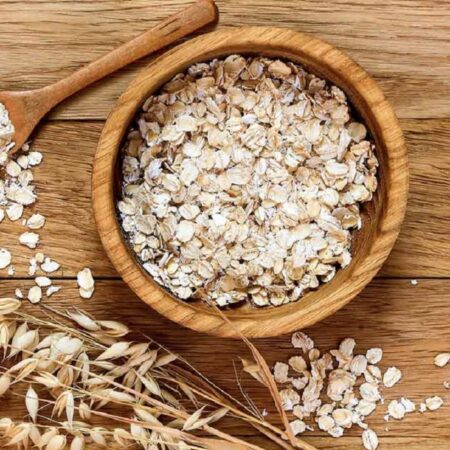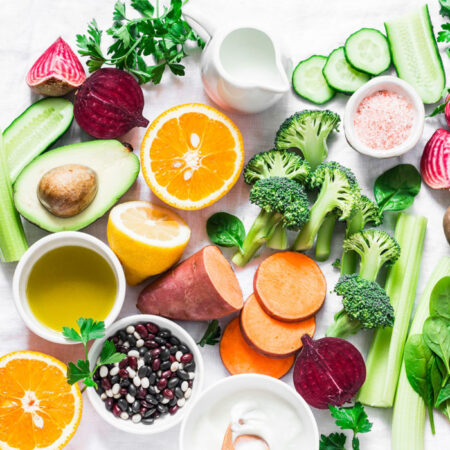
Remember those TV advertisements where they market salt as iodized? Any idea why they do that? Simply because iodine deficiency is on the rise, so much so that around 40% of people around the world are at risk (1).
Just to give a background, iodine is a vital component needed to run your body’s mechanism, making its intake necessary and important. But not many know about benefits of iodine in the functioning of the human body. If that is the case with you as well, this post is for you.
Keep reading to know more.
What Is Iodine?
Discovered in the 1800s by a French chemist, iodine is a non-metallic element found mostly in the oceans and soil. It is a rare water-soluble trace element that plays a significant role in metabolism and the development of the nervous system (2). You need to consume iodine in adequate quantities to sustain various systems in your body, particularly the thyroid glands. A deficiency in iodine causes significant repercussions and leads to serious health problems (3). Iodine combines with other substances, such as potassium, forming potassium iodide, which is added to processed salt.
So, with such a prominent role to play, iodine deficiency in your body is sure to become apparent through a problem. Let’s take a look at that aspect now.
Iodine Deficiency
The lack of sufficient quantity of iodine in your body leads to iodine deficiency. Some of the symptoms include enlargement of the thyroid glands, depression, anxiety, mental issues, and autism. The reasoning capabilities decrease, and lethargy takes over. Metabolism is severely affected, leading to weight gain, constipation, and improper digestion. Immunity also decreases and you become more prone to cold, cough, and fever. Hormonal imbalance occurs, and it can lead to emotional turmoils. Women experience a slight pain in the breast(s) during menstruation.
When iodine deficiency gets extreme, it leads to organ failure and irregular thyroid function, affecting the metabolic activities of the body. Iodine deficiency is a serious issue among pregnant woman (4). It decides the mother’s and child’s health and can majorly affect the mental and physical capabilities of the fetus. Studies have shown that iodine deficiency and autism are linked (5). Though further research is required in this area, iodine deficiency and autism share a frightening correlation (6).
Iodine deficiency is a global health issue affecting both the developing and developed nations. With iodine-rich topsoil rapidly depleting across the world due to environmental pollution, it is becoming more and more of an issue to procure iodine naturally.
To avoid iodine deficiency, you need to consume sufficient iodine and keep a tab on the iodine levels in your body. Keep reading to know how to do that.
Recommended Intake Of Iodine
First, let’s find out how much iodine your body requires. The recommended average daily intake for an adult is at least 150 mcg (micrograms), which goes up to 250 mcg for pregnant women (7). For children, the range varies from 90-150 mcg, depending on their age. Get a check-up done regularly to know your iodine levels.
There are various sources of iodine. A couple of foods and over the counter supplements contain iodine required by our body. Some of them are mentioned below:
- Grain products
- Dairy, especially milk
- Eggs
- Seafood
- Fruits and vegetables
- Iodized salt
Health Benefits Of Iodine
Here are some significant iodine benefits for your health. Let’s take a look at them now. Read on.
1. Regulates Metabolism
Iodine makes or breaks the metabolic function of your body as it assists in the production of hormones that influence the metabolic activity of your body. Iodine aids better absorption of food and its subsequent conversion into energy. The calories are burnt to turn into energy, enabling weight loss. Otherwise, they get stored as excess fats, leading to weight gain and lethargy. This process keeps you active and energetic throughout the day and leads to peaceful sleep at night, thereby indirectly eliminating depression and insomnia (8).
2. Supports The Thyroid Gland
The thyroid gland uses iodine to produce hormones, like thyroxine and triiodothyronine, which help in the functioning of various life-sustaining mechanisms. Lack of iodine causes the thyroid gland to enlarge and leads to ailments like cretinism, hypothyroidism, and goiter. The thyroid gland needs many nutrients to maintain its proper functioning, and iodine is the most important of all. A lack of iodine leads to abnormal thyroid gland function, leading to a host of problems like memory impairment, hair loss, and allergies (9).
3. Supports The Reproductive System
The reproductive organs grow and mature naturally with the help of iodine. Also, iodine enables easy pregnancy with minimal complications and protects the unborn child from neurological problems. Proper intake of iodine keeps the mother and child healthy, specifically the unborn child, as it is a deciding factor of their mental and physical health. Iodine supplements are recommended for pregnant women to meet their high iodine requirement as they have to consume for themselves and the unborn child. The careful and proper intake of iodine lessens the chances of low birth weight, prematurity, stillbirths, autism, and many other pregnancy related issues (10).
4. Strengthens The Immune System
Bacteria and viruses cannot thrive in an iodine-rich environment. Hence, iodine protects your body from diseases. It builds a strong defense by activating the antioxidants and shielding your body from life-threatening problems like heart diseases and cancer. Iodine deficiency can result in impaired immunity, which is why adequate iodine is necessary for a strong immune system (11).
5. Prevents Hypothyroidism
The intake of adequate iodine protects your body from a condition called hypothyroidism, the enlargement of the thyroid gland present in the frontal part of the neck. This expansion causes many functions of the body to slow down and leads to massive weight increase. It leads to drying of skin, lower concentration, cramps, swelling, constipation, and in extreme cases, coma and heart failure. The presence of adequate amount of iodine in the body eliminates chances of such extremities on the body (12).
6. Might Help Treat Fibrocystic Disease
Women who suffer from fibrocystic disease, a condition in which lumps grow in the breasts, can find solace in iodine. It reduces the signs of fibrosis and protects you from the pain and unease that comes with it. Iodine is, therefore, used extensively in modern and alternative therapies to cure fibrosis. Iodine enables stable and functional estrogen production, which takes care of the breast health and eliminates the formation of lumps and cysts in the breasts. Though this area warrants further research, preliminary tests have proved the link between iodine and fibrocystic disease treatment (13).
7. Sustains Cognitive Abilities
If you can think and perceive correctly, you should thank the iodine in your body for helping you do so. If there is any sign of a drop in your brain activities, immediately check your body’s iodine levels. Studies have proven an instant improvement in mental skills after iodine intake. It increases productivity in adults and develops cognitive capabilities in growing children (14).
8. Regulates Hormones
The thyroid gland produces and regulates many of the hormones in your body. Iodine plays a vital role in the functioning of the thyroid gland, thereby keeping your hormones in check and preventing them from fluctuating. Hormones regulate a lot of processes in your body, and iodine enables them to work well (15).
9. Protects Against Radiation
Iodine protects the thyroid gland in your body from absorbing radioactive elements, protecting the gland from an ensuing radiation injury. This property of iodine comes in handy if there is a nuclear leakage or disaster at a power plant. Also, doctors use iodine to treat patients suffering from radiation treatments (16).
10. Fights Pathogens
Iodine is preferred to treat disease-causing pathogens. Oral antibiotics kill the good bacteria along with the bad ones, depriving the body of healthy bacteria and leaving unnecessary residue in your body (17). On the other hand, though iodine has a similar effect as an antibiotic, it does not damage the good bacteria that the body needs.
11. Offers Protection Against Cancer
Iodine helps your body shrink and kill the cancer-causing cells. In a process called apoptosis, which is systematic cell death in multicellular organisms, iodine stops and kills the cells that can continually grow and kill the body. Iodine plays a role in preventing thyroid, breast, prostate, and gastric cancers (18).
12. Keeps You Energetic
The presence of iodine in your body keeps you up and active. Iodine aids the thyroid gland to function properly and helps you move around with enthusiasm, agility, and positivity (19).
13. Keeps Your Nails Strong
Iodine strengthens weak and brittle nails. It improves their overall condition and protects them from infection. A well-balanced diet will ensure proper intake of iodine, which will maintain your nail health and guarantee clear, hard, and chip-proof nails (20).
14. Improves Oral Health
Iodine kills the harmful bacteria in your mouth, preventing tooth decay and dullness. It cleanses and strengthens the teeth and is a disinfectant that keeps your teeth strong and healthy. It keeps your mouth fresh and odor-free (21).
Benefits Of Iodine For Skin
Iodine aids the formation of healthy and radiant skin. It keeps dry skin at bay and regulates the moisture levels of the skin. It accelerates the healing of scars and cuts, promotes skin repair, and keeps a check on the hormones that cause acne. It delays the signs of aging by slowing down the formation of wrinkles and fine lines (22).
Benefits Of Iodine For Hair
Iodine is the go-to for long and lustrous hair as it ensures proper hair growth and prevents hair breakage. Iodine is restorative for the hair as it kills the fungus that attacks the hair follicles. Iodine’s antiseptic properties protect the scalp from infections, providing a clean space for hair to grow (23).
To reap these benefits, it is important you consume iodine-rich foods. Listed below are a few of them.
Iodine-Rich Foods

Consuming iodine-rich foods helps you prevent iodine deficiency. It is best to include foods in your diet that naturally contain iodine instead of the chemically induced ones. There are many iodine-rich foods available, and here, we have made a list of some readily available ones.
1. Potatoes
Baked potatoes have the maximum iodine content as compared to any other cooked form of potatoes. A medium-sized potato can give up to 40% of the recommended daily intake of iodine, which is about 60 mcg.
2. Milk
Having a glass of milk once in the morning and once in the evening will help you meet your daily iodine intake. Milk, apart from containing calcium, vitamin D, and other useful minerals, has iodine in the right quantity. A medium-sized glass of milk can provide 37% of iodine intake necessary for daily needs and contains 56 micrograms of it.
3. Iodized Salt
Can you imagine eating a dish without salt? Difficult to imagine, right? Keeping this in mind, salt has been iodized so that there is no way you’ll miss having it. It is the easiest way to take in iodine because you tend to add salt to almost every dish you eat. A gram of iodized salt contains about 77 mcg of iodine.
4. Bananas
Banana is one commonly available fruit that is full of nutrients and found throughout the year. A medium-sized banana contains about 3 mcg of iodine. Consume the fruit every day either by eating it directly or adding it to a smoothie or a salad.
5. Boiled Eggs
Boiled eggs are the simplest to make! They are light and healthy, and you can gobble them up without a fuss. One large egg contains 12 mcg of iodine, which is about 10% of the required daily iodine intake. Have the eggs at mealtime or as snacks to meet the iodine needs of your body.
6. Seafood
Seafood is a good source of iodine. Cod, snapper, canned salmon, andcanned albacore tuna are low in calories and rich in iodine and also loaded with good fats PUFAs and MUFAs.
As we have seen, iodine is important for your body. But, as in the case of any other mineral, consuming it in excess can have undesirable effects. Read on to know more.
Side Effects Of Iodine Overdose
Iodine can cause side effects in a few people when taken in high quantities. Sometimes, it tends to cause problems in some people even if it is not an overdose. Some side effects of iodine are headache, nausea, racing heart, high fever, stomach pain, diarrhea, vomiting, thirst, and a runny nose. It is best to consult a doctor when you notice such symptoms. You also need to keep a tab on your iodine intake and make sure you don’t go overboard with it (24).
One good way to ensure you don’t overdo your iodine intake is to consume it naturally. How? That’s where we are heading.
To Increase The Iodine Levels In Your Body Naturally
As we discussed earlier, it is best to take iodine naturally. Supplements are readily available in the market, but when you can get hold of naturally rich sources of iodine, then it is best to go with them. The surroundings you are in, the place your food is growing, and the freshness of air matter in increasing the iodine levels in your body naturally. Read below to know how.
- Eat organically grown foods and those coming from the iodine-rich top soil. Make sure the food is stored in ceramic containers.
- Buy bread and flour that are organic and whole wheat. Avoid foods that contain bromine.
- Buy skin care products that are free of toxic chemicals.
- When in closed spaces, open the windows and let fresh air come in to keep the area clean and airy.
- Have clean and fresh water instead of fizzy drinks and sodas.
Taking Iodine Supplements
When the intake of iodine through natural ways is not sufficient, take iodine supplements like potassium iodide, sodium iodide, and Lugol’s solution to enhance your iodine levels. Consuming them is easy. Just mix the supplements either in water or a fruit juice and drink it up.
Iodine deficiency is a serious health issue in the developing nations. So, it is very necessary for you to make sure your body is getting enough iodine and consume it in a way that is safe for your entire system.
So, that was about benefits of iodine, let us now look at a few frequently asked questions:
Expert’s Answers For Readers’ Questions
Q. Does iodine come under the category of vitamins or minerals?
A. Iodine is a mineral and a chemical element.
Q. Are iodine supplements expensive?
A. Iodine supplements are not very expensive compared to other health supplements. They are readily available over the counter at medical stores.
Q. How is salt iodized?
A. Thoroughly powdered salt and a mild solution of potassium iodate are mixed to make iodized salt.
Q. Is there a difference in the appearance of common salt and iodized salt? /p>
A. There is no difference in the appearance and taste between both the salts. A salt test has to be done to know the difference.
Hope you found the above information on benefits of iodine useful. Do monitor your iodine intake and be aware of its effects so that you can make informed choices. If you have any feedback or questions, please post them in the comments section below.























